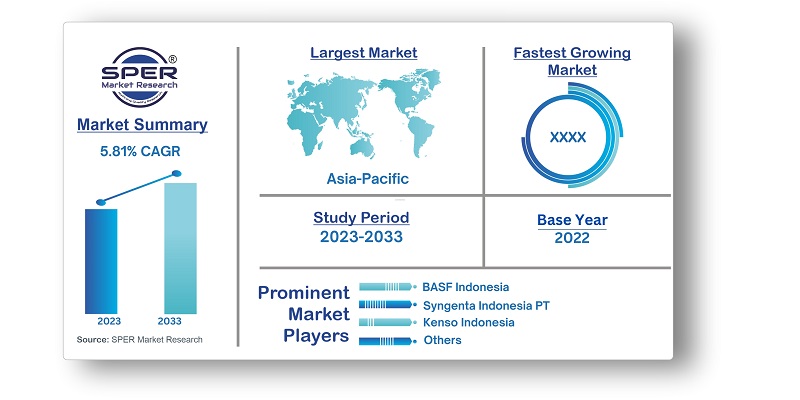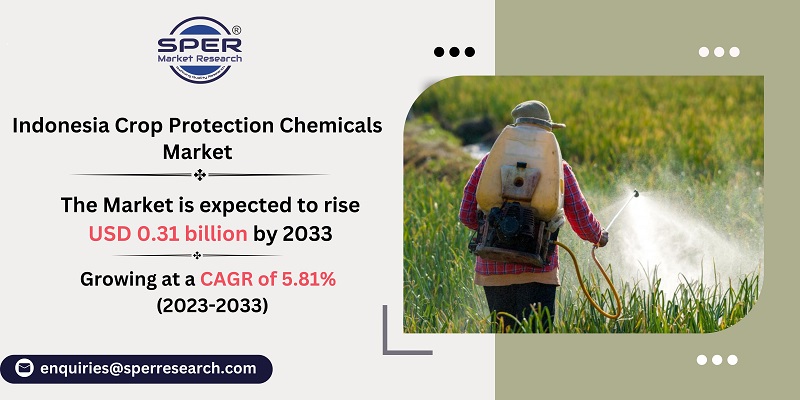
Indonesia Crop Protection Chemicals Market Growth, Size, Trends, Revenue and Future Competition
Indonesia Crop Protection Chemicals Market Size- By Origin, Product Type, By Application- Regional Outlook, Competitive Strategies and Segment Forecast to 2033
| Published: Sep-2023 | Report ID: AGRI2344 | Pages: 1 - 108 | Formats*: |
| Category : Agriculture | |||
- PT Agricon Indonesia introduced their new Brofreya 53 SC products in February 2022. Using this patented product, lepidopteran caterpillars can be eliminated. Agricon and MCAG jointly created it.
- March 2022: Acechem (Suzhou Ace Chemical Technology Co., Ltd.) focuses on agricultural protection segments in Indonesia, integrating and utilizing domestic and foreign scientific knowledge and practical experience, such as China and Vietnam, to improve end-users' and local partners' experiences and benefits with branded innovative products and technical services.


| Report Metric | Details |
| Market size available for years | 2019-2033 |
| Base year considered | 2022 |
| Forecast period | 2023-2033 |
| Segments covered | By Origin, Product Type, By Application |
| Regions covered | Eastern Region, Southern Region, Western Region, Northern Region |
| Companies Covered | PT. BASF Indonesia, Syngenta Indonesia PT., Corteva Agriscience, Agricon Indonesia, Biotis Agrindo, PT. Agro Guna Makmur (AGM), PT. CBA Chemical Industry, PT. Prima Agro Tech, PT. Nufarm Indonesia, PT. Royal Agro Indonesia (ADAMA Indonesia), UPL Limited, and PT. Kenso Indonesia. |
- Farmers
- Agricultural Retailers and Distributors
- Government Agencies and Regulators
- Agricultural Cooperatives
- Crop Consultants and Agronomists
- Research and Development Institutions
- Environmental and Consumer Advocacy Groups
- Agrochemical Manufacturers and Suppliers
- Exporters and Importers
| By Mode of Payment: |
|
| By Product Type: |
|
| By Application: |
|
- Indonesia Crop Protection Chemicals Market Size (FY’2023-FY’2033)
- Overview of Indonesia Crop Protection Chemicals Market
- Segmentation of Indonesia Crop Protection Chemicals Market By Origin (Synthetic, Bio-Based)
- Segmentation of Indonesia Crop Protection Chemicals Market By Product Type (Herbicides, Insectides, Fungicides, Others)
- Segmentation of Indonesia Crop Protection Chemicals Market By Application (Grains and Cereals, Oilseeds and Pulses, Fruit and Vegetables, Turfs and Ornamental, Commercial Crops, Others)
- Statistical Snap of Indonesia Crop Protection Chemicals Market
- Expansion Analysis of Indonesia Crop Protection Chemicals Market
- Problems and Obstacles in Indonesia Crop Protection Chemicals Market
- Competitive Landscape in the Indonesia Crop Protection Chemicals Market
- Impact of COVID-19 and Demonetization on Indonesia Crop Protection Chemicals Market
- Details on Current Investment in Indonesia Crop Protection Chemicals Market
- Competitive Analysis of Indonesia Crop Protection Chemicals Market
- Prominent Players in the Indonesia Crop Protection Chemicals Market
- SWOT Analysis of Indonesia Crop Protection Chemicals Market
- Indonesia Crop Protection Chemicals Market Future Outlook and Projections (FY’2023-FY’2033)
- Recommendations from Analyst
1.1. Scope of the report1.2. Market segment analysis
2.1. Research data source2.1.1. Secondary Data2.1.2. Primary Data2.1.3. SPER’s internal database2.1.4. Premium insight from KOL’s2.2. Market size estimation2.2.1. Top-down and Bottom-up approach2.3. Data triangulation
4.1. Driver, Restraint, Opportunity and Challenges analysis4.1.1. Drivers4.1.2. Restraints4.1.3. Opportunities4.1.4. Challenges4.2. COVID-19 Impacts of the Indonesia Crop Protection Chemicals Market
5.1. SWOT Analysis5.1.1. Strengths5.1.2. Weaknesses5.1.3. Opportunities5.1.4. Threats5.2. PESTEL Analysis5.2.1. Political Landscape5.2.2. Economic Landscape5.2.3. Social Landscape5.2.4. Technological Landscape5.2.5. Environmental Landscape5.2.6. Legal Landscape5.3. PORTER’s Five Forces5.3.1. Bargaining power of suppliers5.3.2. Bargaining power of buyers5.3.3. Threat of Substitute5.3.4. Threat of new entrant5.3.5. Competitive rivalry5.4. Heat Map Analysis
6.1. Indonesia Crop Protection Chemicals Market Manufacturing Base Distribution, Sales Area, Product Type6.2. Mergers & Acquisitions, Partnerships, Product Launch, and Collaboration in Indonesia Crop Protection Chemicals Market
7.1. Indonesia Crop Protection Chemicals Market Value Share and Forecast, By Origin, 2023-20337.2. Synthetic7.3. Bio-based
8.1. Indonesia Crop Protection Chemicals Market Value Share and Forecast, By Product Type, 2023-20338.2. Herbicides8.3. Insecticides8.4. Fungicides8.5. Others
9.1. Indonesia Crop Protection Chemicals Market Value Share and Forecast, By Application, 2023-20339.2. Grains and Cereals9.3. Oilseeds and Pulses9.4. Fruit and Vegetables9.5. Turfs and Ornamental9.6. Commercial Crops9.7. Others
10.1. Indonesia Crop Protection Chemicals Market Size and Market Share
11.1. Indonesia Crop Protection Chemicals Market Size and Market Share By Origin (2019-2026)11.2. Indonesia Crop Protection Chemicals Market Size and Market Share By Origin (2027-2033)
12.1. Indonesia Crop Protection Chemicals Market Size and Market Share By Product Type (2019-2026)12.2. Indonesia Crop Protection Chemicals Market Size and Market Share By Product Type (2027-2033)
13.1. Indonesia Crop Protection Chemicals Market Size and Market Share By Application (2019-2026)13.2. Indonesia Crop Protection Chemicals Market Size and Market Share By Application (2027-2033)
14.1. Indonesia Crop Protection Chemicals Market Size and Market Share By Region (2019-2026)14.2. Indonesia Crop Protection Chemicals Market Size and Market Share By Region (2027-2033)14.3. Eastern Region14.4. Southern Region14.5. Western Region14.6. Norther Region
15.1. PT. BASF Indonesia15.1.1. Company details15.1.2. Financial outlook15.1.3. Product summary15.1.4. Recent developments15.2. Syngenta Indonesia PT.15.2.1. Company details15.2.2. Financial outlook15.2.3. Product summary15.2.4. Recent developments15.3. Corteva Agriscience15.3.1. Company details15.3.2. Financial outlook15.3.3. Product summary15.3.4. Recent developments15.4. Agricon Indonesia15.4.1. Company details15.4.2. Financial outlook15.4.3. Product summary15.4.4. Recent developments15.5. Biotis Agrindo15.5.1. Company details15.5.2. Financial outlook15.5.3. Product summary15.5.4. Recent developments15.6. PT. Agro Guna Makmur (AGM)15.6.1. Company details15.6.2. Financial outlook15.6.3. Product summary15.6.4. Recent developments15.7. PT. CBA Chemical Industry15.7.1. Company details15.7.2. Financial outlook15.7.3. Product summary15.7.4. Recent developments15.8. PT. Prima Agro Tech15.8.1. Company details15.8.2. Financial outlook15.8.3. Product summary15.8.4. Recent developments15.9. PT. Nufarm Indonesia15.9.1. Company details15.9.2. Financial outlook15.9.3. Product summary15.9.4. Recent developments15.10. PT. Royal Agro Indonesia (ADAMA Indonesia)15.10.1. Company details15.10.2. Financial outlook15.10.3. Product summary15.10.4. Recent developments15.11. UPL Limited15.11.1. Company details15.11.2. Financial outlook15.11.3. Product summary15.11.4. Recent developments15.12. Others
SPER Market Research’s methodology uses great emphasis on primary research to ensure that the market intelligence insights are up to date, reliable and accurate. Primary interviews are done with players involved in each phase of a supply chain to analyze the market forecasting. The secondary research method is used to help you fully understand how the future markets and the spending patterns look likes.
The report is based on in-depth qualitative and quantitative analysis of the Product Market. The quantitative analysis involves the application of various projection and sampling techniques. The qualitative analysis involves primary interviews, surveys, and vendor briefings. The data gathered as a result of these processes are validated through experts opinion. Our research methodology entails an ideal mixture of primary and secondary initiatives.



Frequently Asked Questions About This Report
PLACE AN ORDER
Year End Discount
Sample Report
Pre-Purchase Inquiry
NEED CUSTOMIZATION?
Request CustomizationCALL OR EMAIL US
100% Secure Payment






Related Reports
Our Global Clients
Our data-driven insights have influenced the strategy of 200+ reputed companies across the globe.




















